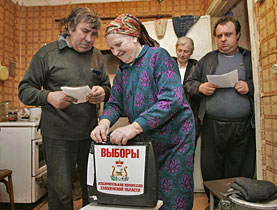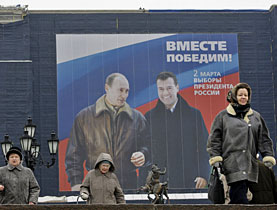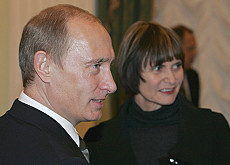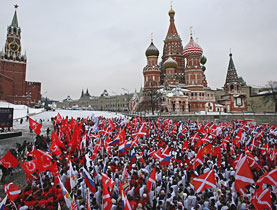Government gives Medvedev cautious welcome

Swiss President Pascal Couchepin has said there is "no doubt over the legitimacy" of Dmitry Medvedev's win in Sunday's Russian presidential election.
But Swiss parliamentarian Andreas Gross – head of the Council of Europe’s monitoring mission – told swissinfo that the vote, which Medvedev won by a landslide, was “neither free nor fair”.
Speaking at a news conference in Slovenia, Couchepin said it was beyond doubt that the “impressive result” notched up by Medvedev, who had been hand-picked by President Vladimir Putin, reflected the popular opinion in Russia.
A nearly complete preliminary count showed Medvedev had received about 70 per cent of the vote.
Nevertheless Couchepin said he hoped Russia’s democratic standards would move closer towards those of the European Union.
Gross, who presented a report on the vote on Monday morning, agreed that the election reflected the will of the people, but said unfair access to media put into question the overall fairness of the vote.
“The election was neither free nor fair – but that’s too simple a question and too simple an answer,” Gross told swissinfo.
“Seventy per cent of the [Russian] people say ‘we are ready to choose to vote for any proposition that Putin puts to us’ yet at the same time 45 per cent say they don’t trust the process. These figures show the complexity of the situation. When you want to serve democracy, you can’t just skip the complexity by saying ‘not free and not fair’ – this doesn’t help.”
Gross said the inability of liberal opposition candidates to get their names on the ballot also made the election less than free.
While Medvedev was given extensive television news coverage throughout the campaign, the three other candidates were shown only infrequently except during televised debates. Medvedev, however, refused to take part in the debates, citing his busy schedule as first deputy prime minister.
“Discredited democracy”
Gross added that Sunday’s election repeated most of the flaws revealed during the parliamentary election in December and criticised the elections commission for not addressing the problems.
“The notion of democracy in Russia is totally discredited,” he said, explaining Russia’s dalliance with democracy in the Nineties.
“The situation [in the Nineties] was chaotic, the state lost the capacity to organise society and people lost self-esteem. This is why today any authoritarian way of reducing democracy finds a lot of support.”
“Also four or five years ago Russia changed its legislation and made it difficult to organise politically – to become a party or a candidate. This shows today, where we faced elections that did not give a real choice to the people.”
Gross’s 25-member observer mission from the Parliamentary Assembly of the Council of Europe had been in Russia since Wednesday.
It is the only group of European election monitors in the country. The Organization for Security and Cooperation in Europe (OSCE) decided against sending its observers last month, citing too many restrictions by Moscow. Russia has called the move “unacceptable”.
Gross, a member of the centre-left Social Democratic Party, has carried out 45 election observations in the past 12 years, including the Russian parliamentary poll last December, which was declared unfair by European monitors.
swissinfo, Thomas Stephens
Switzerland:
Population: 7.5 million
Area: 41,284 sq km
Gross National Income per capita: $54,930
Russia:
Population: 143.8 million
Area: 17 million sq km
GNI per capita: $4,460
Contacts were established in the 18th century. In the 19th century Russia was one of the guarantee powers for permanent Swiss neutrality, making a significant contribution to the formulation of the Swiss political system. One famous Russian emigrant to live in Switzerland last century was Lenin.
Switzerland opened a consulate in St Petersburg in 1816, upgrading to a legation 90 years later. The two countries broke off diplomatic relations in 1923 when Russia was going through a period of revolutionary turmoil. They were resumed in 1946.
Since the end of the Cold War contacts have become closer in the political, economic and scientific fields. Switzerland is one of the most important foreign investors in Russia.
The presidential elections, for Russia’s third president since the collapse of the Soviet Union, took place on Sunday.
Standing against First Deputy Prime Minister Dmitry Medvedev were Communist party leader Gennady Zyuganov, Liberal Democratic Party leader Vladimir Zhirinovsky – both political veterans – and Andrei Bogdanov, the little known leader of the Democratic Party of Russia. None of Russia’s liberal opposition parties has a candidate in the race.
Around 300 international observers were monitoring the vote, according to Russia’s Central Electoral Commission. The Council of Europe’s mission, headed by Andreas Gross, presented its preliminary conclusions on Monday.

In compliance with the JTI standards
More: SWI swissinfo.ch certified by the Journalism Trust Initiative




You can find an overview of ongoing debates with our journalists here . Please join us!
If you want to start a conversation about a topic raised in this article or want to report factual errors, email us at english@swissinfo.ch.